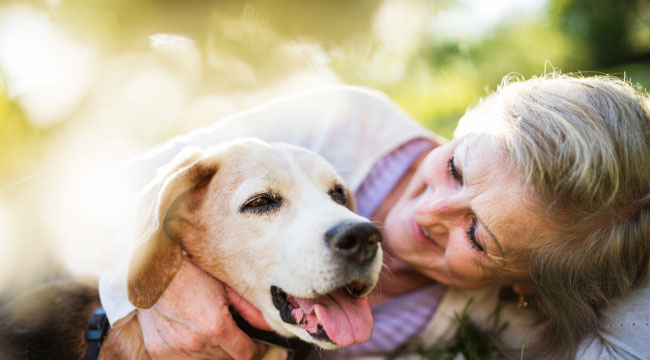
As our furry friends age, their needs change, and they require extra care and attention to ensure they live a comfortable and happy life. Caring for an elderly dog involves addressing their specific physical and emotional needs. In this article, we will explore essential tips and guidelines to help you take care of your aging canine companion with love and compassion.
Regular Veterinary Check-ups
As your dog ages, regular visits to your veterinarian become more important. Check-ups should be scheduled often to monitor their health, see if there are any underlying conditions, and ensure timely treatment. Your vet can provide specific recommendations on vaccinations, dental care, and dietary adjustments suitable for your elderly dog.
Proper Nutrition
Part of Older Dog Care is a well-balanced diet. These diets are vital for the health and longevity of your elderly dog. Speak with your vet about adjusting their diet to accommodate their changing nutritional requirements. Senior dog food formulas are available, which are specifically designed to meet the needs of older dogs. These formulas often contain lower calories, increased fiber, and joint-supporting supplements.
Adequate Exercise
While your older dog may not be as energetic as before, regular exercise is still important for maintaining their mobility and overall well-being. Adjust the intensity and duration of exercise to match their capabilities. Gentle walks, light play sessions, and low-impact activities are ideal. Be observant of any signs of discomfort or exhaustion and provide ample rest breaks as needed.
Joint Care
As dogs age, joint problems such as arthritis or stiffness become more common. Take measures to promote joint health and alleviate any discomfort. Provide your dog with a comfortable and supportive bed to rest on. Consider incorporating joint supplements, such as glucosamine and chondroitin, into their diet after consulting with your vet. Controlled exercise and warm compresses can also help ease joint pain.
Dental Care
Maintaining good dental hygiene is crucial for your elderly dog’s overall health. Periodontal disease can lead to various health issues, including heart and kidney problems. Brush your dog’s teeth regularly with a dog-friendly toothbrush and toothpaste. Additionally, dental treats and toys can help reduce plaque buildup. Schedule regular dental check-ups and cleanings with your veterinarian.
Mental Stimulation
Keeping your elderly dog mentally stimulated is essential to prevent boredom and cognitive decline. Engage them in activities that challenge their minds, such as puzzle toys or treat-dispensing games. Spend quality time with your dog, offering gentle training sessions and interactive play. Providing a stimulating environment can help keep their brain active and enhance their overall well-being.
Comfortable Environment
Make adjustments to your home to ensure a safe and comfortable environment for your elderly dog. Provide soft bedding in easily accessible areas, especially if your dog has difficulty with stairs or jumping onto furniture. Consider installing ramps or steps to help them navigate around the house. Keep the environment well-lit to aid their vision, and use baby gates to restrict access to hazardous areas.
Love and Companionship
Lastly, shower your elderly dog with love, attention, and companionship. Spend quality time together, providing gentle affection and reassurance. Older dogs often appreciate a predictable routine and a calm environment. Be patient and understanding as they may experience age-related changes in behavior or temperament. Your love and care will go a long way in making their golden years truly special.
Conclusion
Caring for an elderly dog requires a compassionate and tailored approach. By following these tips on regular veterinary care, proper nutrition, exercise, joint care, dental hygiene, mental stimulation, a comfortable environment, and the power of love and companionship, you can ensure your aging canine companion enjoys their later years with joy and comfort. Cherish the moments you share and cherish the unwavering.



